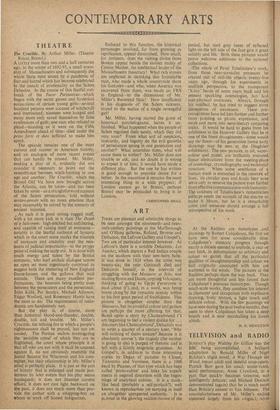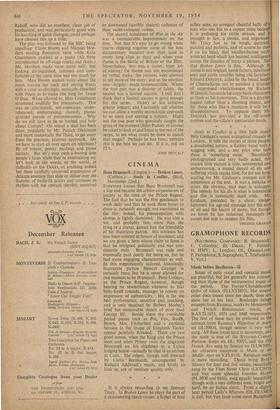BBC being accomplished. A brilliant adaptation by Ronald Miller of
Nigel Balchin's slight novel, A Way Through the Wood, meant adult and tasteful soap-opera. Patrick Barr gave his usual, under-rated, solid performance; Anne Crawford, in a part that quickly becomes tiresome, was intelligently delicate; and Michael Denison demonstrated (again) that he is much more than Britain's answer to Van Johnson. The unsatisfactoriness of Mr. Miller's ending stemmed largely from his original; Alvin Rakoff, who did an excellent, clean job of production, and was particularly good with his handling of quick dialogue, could perhaps have cleaned this up a little.
The play was followed by the BBC being appalling: Claire Bloom and Michael Hor- dern reading Romantic verse while Kyla Greenbaum plucked at a piano (All three accompanied by off-stage creaks and thuds.) Mr. Hordern reads verse• quite well; but looking distinguished, cultured and com- fortable at the same time was too much for him. Miss Bloom snaked sadly about the room waving her neck and cooing Keats with a voice so cloyingly, musically drenched with Poesy as to make one long for Tessie O'Shea. When allowed to, Miss Greenbaum strummed soulfully but innocuously. This was an .amateurish, self-conscious, under- rehearsed, embarrassing, clumsily photo- graphed parade of pretentiousness. Why do we still have to be so hushed and holy about Culture? On sound a deal has been done, popularly by Mr. Patrick Dickinson and more esoterically the Third, to get away from the precious, plummy approach. Do we have to start all over again on television? By all means, poetry readings and piano recitals. But let's stop peek-a-booing into people's faces while they're entertaining us; let's look at the words, or the world, at daffodils or the Docks, at anything indeed but these carefully contrived expressions of delicate emotion that slide or slither over the, features of badly-lit actors and actresses in rhythm with the upward (terribly sensitive) or downward (terribly sincere) cadences of their violet-coloured voices.
The second instalment of War ,in the Air was a considerable.. improvement on the first. Not that it's easy to go wrong when you're clipping together some of the best documentary material ever shot (and in pretty long clips at that) and when your theme is the Battle of Britain or the Blitz. Nevertheless, this was. a tauter, truer job of editing; the theme was less encumbered by verbal tricks; the pictures were allowed to tell more of the story; and so the emotion was—largely—made communicable. Where the first part was a disaster of falsity, the second was a limited success. I still don't think that a limited success is good enough for this series. Victory at Sea achieved greater impact; and I earnestly ask whether we can allow a worthy second-rate approach to so stern and stirring a subject. Might not the one poet who genuinely caught the grace of the moment (John Pudncy of course) be asked to look at and listen to the rest of the series, to see what could be done to match that magic? Perhaps he has been; perhaps this is the best we can do. If it is, roll on ITA.
JOHN METCALF











































































 Previous page
Previous page